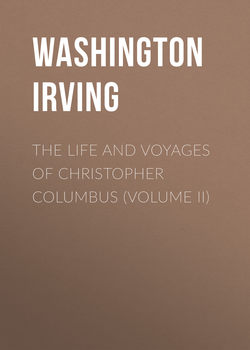The Life and Voyages of Christopher Columbus (Volume II)

Реклама. ООО «ЛитРес», ИНН: 7719571260.
Оглавление
Washington Irving. The Life and Voyages of Christopher Columbus (Volume II)
Book XI
Chapter I
Chapter II
Chapter III
Chapter IV
Chapter V
Chapter VI
Chapter VII
Book XII
Chapter I
Chapter II
Chapter III
Chapter IV
Chapter V
Chapter VI
Chapter VII
Book XIII
Chapter I
Chapter II
Chapter III
Chapter IV
Book XIV
Chapter I
Chapter II
Chapter III
Chapter IV
Chapter V
Book XV
Chapter I
Chapter II
Chapter III
Chapter IV
Chapter V
Chapter VI
Chapter VII
Chapter VIII
Chapter IX
Chapter X
Book XVI
Chapter I
Chapter II
Chapter III
Chapter IV
Chapter V
Chapter VI
Book XVII
Chapter I
Chapter II
Chapter III
Chapter IV
Book XVIII
Chapter I
Chapter II
Chapter III
Chapter IV
Chapter V
Appendix:
No. I
No. II
No. III
No. IV
No. V
No. VI
No. VII
No. VIII
No. IX
No. X
No. XI
No. XII
No. XIII
No. XIV
No. XV
No. XVI
No. XVII
No. XVIII
No. XIX
No. XX
No. XXI
No. XXII
No. XXIII
No. XXIV
No. XXV
No. XXVI
No. XXVII
No. XXVIII
No. XXIX
No. XXX
No. XXXI
No. XXXII
No. XXXIII
No. XXXIV
No. XXXV
No. XXXVI
No. XXXVII
No. XXXVIII
Отрывок из книги
Columbus had anticipated repose from his toils on arriving at Hispaniola, but a new scene of trouble and anxiety opened upon him, destined to impede the prosecution of his enterprises, and to affect all his future fortunes. To explain this, it is necessary to relate the occurrences of the island during his long detention in Spain.
When he sailed for Europe in March, 1496, his brother, Don Bartholomew, who remained as Adelantado, took the earliest measures to execute his directions with respect to the mines recently discovered by Miguel Diaz on the south side of the island. Leaving Don Diego Columbus in command at Isabella, he repaired with a large force to the neighborhood of the mines, and, choosing a favorable situation in a place most abounding in ore, built a fortress, to which he gave the name of San Christoval. The workmen, however, finding grains of gold among the earth and stone employed in its construction, gave it the name of the Golden Tower. 1
.....
When Roldan resumed his office of alcalde mayor, or chief judge, he displayed all the arrogance to be expected from one who had intruded himself into power by profligate means. At the city of San Domingo, he was always surrounded by his faction; communed only with the dissolute and disaffected; and, having all the turbulent and desperate men of the community at his beck, was enabled to intimidate the quiet and loyal by his frowns. He bore an impudent front against the authority even of Columbus himself, discharging from office one Rodrigo Perez, a lieutenant of the admiral, declaring that none but such as he appointed should bear a staff of office in the island. 47 Columbus had a difficult and painful task in bearing with the insolence of this man, and of the shameless rabble which had returned, under his auspices, to the settlements. He tacitly permitted many abuses; endeavoring by mildness and indulgence to allay the jealousies and prejudices awakened against him, and by various concessions to lure the factious to the performance of their duty. To such of the colonists generally as preferred to remain in the island, he offered a choice of either royal pay or portions of lands, with a number of Indians, some free, others as slaves, to assist in the cultivation. The latter was generally preferred; and grants were made out, in which he endeavored, as much as possible, to combine the benefit of the individual with the interests of the colony.
Roldan presented a memorial signed by upwards of one hundred of his late followers, demanding grants of lands and licenses to settle, and choosing Xaragua for their place of abode. The admiral feared to trust such a numerous body of factious partisans in so remote a province; he contrived, therefore, to distribute them in various parts of the island; some at Bonao, where their settlement gave origin to the town of that name; others on the bank of the Rio Verde, or Green River, in the Vega; others about six leagues thence, at St. Jago. He assigned to them liberal portions of land, and numerous Indian slaves, taken in the wars. He made an arrangement, also, by which the caciques in their vicinity, instead of paying tribute, should furnish parties of their subjects, free Indians, to assist the colonists in the cultivation of their lands: a kind of feudal service, which was the origin of the repartimientos, or distributions of free Indians among the colonists, afterwards generally adopted, and shamefully abused, throughout the Spanish colonies: a source of intolerable hardships and oppressions to the unhappy natives, and which greatly contributed to exterminate them from the island of Hispaniola.48 Columbus considered the island in the light of a conquered country, and arrogated to himself all the rights of a conqueror, in the name of the sovereigns for whom he fought. Of course all his companions in the enterprise were entitled to take part in the acquired territory, and to establish themselves there as feudal lords, reducing the natives to the condition of villains or vassals. 49 This was an arrangement widely different from his original intention of treating the natives with kindness, as peaceful subjects of the crown. But all his plans had been subverted, and his present measures forced upon him by the exigency of the times, and the violence of lawless men. He appointed a captain with an armed band, as a kind of police, with orders to range the provinces; oblige the Indians to pay their tributes; watch over the conduct of the colonists; and check the least appearance of mutiny or insurrection. 50
.....